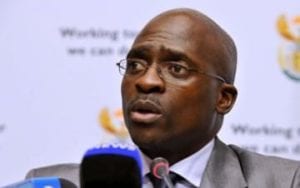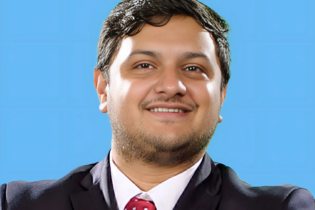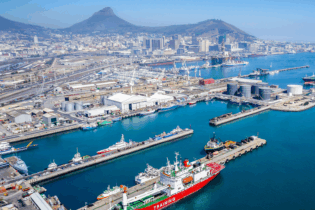Public Enterprises Minister Malusi Gigaba has been tasked with fixing South Africa’s lumbering parastatals.
Although he has held the position for more than 18 months, eight of the major public entities do not have a permanent CEO. Among permanent CEO appointments, seven have been in their jobs for less than two years. Even where leadership has stabilised, many operations still face financial challenges. A number still need significant financial injections to fulfil their mandates. SAA asked the government for a reported R6 billion for recapitalisation in February and last month the head of the carrier’s audit committee, Zakhele Sithole, told parliament’s enterprises portfolio committee SAA’s balance sheet “does not look good”. Eskom is expected to apply for another three years of double-digit tariff increases next month to help fund its capital expansion programme. This week the utility reported a net profit of R13.2 billion for the year to March, partly thanks to high tariff increases. Telkom, a listed company of which the government owns 39.8% and the Public Investment Corporation 10.9%, last week reported a 97.8% drop in its basic earnings a share for the year to March due to, inter alia, a loss of R896-million on the disposal of its Multi-Links foreign operation and a loss of R2.45 billion at its mobile operator 8ta. Transnet appointed Brian Molefe as CEO in February last year after it had spent 20 months without a permanent chief. It has not asked the government for any bail-outs recently, but, like Eskom and Airports Company SA, it has applied for massive user charge increases to help pay for projects with escalating costs, like the multi-product pipeline from Durban to Gauteng. Transnet plans to invest R300 billion in infrastructure in the next seven years, but said earlier this month this will not cover all the projects it would like to undertake. Molefe recently told p arliament’s portfolio committee on economic development there are several risks that could derail Transnet’s investment programme. These include regulatory risks, the eurozone crisis, the possibility of capacity problems and a chance that Transnet might not reach the volumes it needs. Thi s could result in it exceeding its agreed gearing rate of 50%, which would affect the health of it s balance sheet and ability to borrow money. Leadership at public entities like the SA Broadcasting Corporation (SABC) and the SA Post Office is in disarray. The SABC appointed its sixth CEO since 2008 (including acting CEOs) in January and the Post Office will have its fifth CEO in seven years when Molefe Mathibe starts acting in the position next month. Acting CEO Nick Buick resigned last month after only seven months in the hot seat. Stanley Subramoney, deputy CEO of PwC, said there does seem to be a sense of stability in management at some of the larger state-owned enterprises (SOEs) run by the Department of Public Enterprises. Gigaba is the department’s fourth minister in as many years, but has made several key appointments at SOEs since he took office in 2010. Subramoney said the ideal is stability in an SOE’s board, for governance, and stability in management for the successful execution of strategy. “Ideally a company needs continuity in governance and strategy to execute on its mandate,” he said. The time frames of mandates are among the challenges SOE leaders face.“All of these SOEs have a long-term vision. Capital projects and infrastructure are not short-term issues; they run into many years, so stability at the top level is very important,” Subramoney said.
In SA and many countries with similar political systems, the leaders of SOEs face the challenge of having to please a multitude of stakeholders, said Shaun Rozyn, executive director of corporate education at the Gordon Institute of Business Science. “A lot of people can bring your reign [as CEO] to an end. There are trade unions, the government as the sole shareholder, the political party of the day,” Rozyn said. The pressure of staying popular in the short run while delivering on long-term mandates also presents problems. “There are the natural pressures between being popular and ensuring your tenure and the challenge of having to deliver strategically on capital projects which take 10 years.” Rozyn referred to Eskom CEO Brian Dames as an example. “If he decides to go full nuclear because it goes with his mandate of keeping the lights on and that goes against ANC policy, he could quickly find himself out of a job. Not because he made the wrong decision, but because the decision did not please people in the short run.” The SA National Roads Agency most recently felt the problems this pull between short-term politics and long-term goals can create. After being guaranteed that toll fees would be collected from 30 ApriL, the project was halted by the ANC and Cosatu. It is (not) all about moneyAt least four of South Africa’s 21 major public entities suffered losses in the 2010-11 financial year and three were handed qualified audit opinions on their latest financial statements. But, according to PwC deputy CEO Stanley Subramoney: “Large state-owned enterprises [SOEs] often have a dual point of reference in terms of profitability. “From a government perspective, the SOEs need to drive the social agenda, to help grow the economy, create jobs and drive strategic initiatives. These initiatives often do have a [negative] effect on the bottom line of the company itself, but they have a far-reaching macro-effect on the South African economy. “South Africa is in a developmental state and to drive the developmental agenda the large SOEs must be used to drive the broader picture. One cannot expect to put profit before people.” Aside from the bottom line of SOEs, the massive salaries and bonuses of the executives in charge of them often make headlines. Airports Company SA’s former CEO Monhla Hlahla was paid R8.4-million in 2009-10 and Eskom endured harsh criticism last year after its financial results showed its executive committee members were paid 109% more in 2010-11 than in the previous year. In 2011-12 the group’s executive committee were paid 16% more than the last year. The CEO of the Industrial Development Corporation, Geoffrey Qhena, was paid almost R9-million in the 2010-11 financial year. This included bonuses of R4.6 million. Malusi Gigaba, the Minister of Public Enterprises, temporarily suspended pay increases for CEOs and board members of SOEs in his portfolio in March, but said last month that higher salary packages in the private sector were putting pressure on SOEs to compete.
Source: business live








